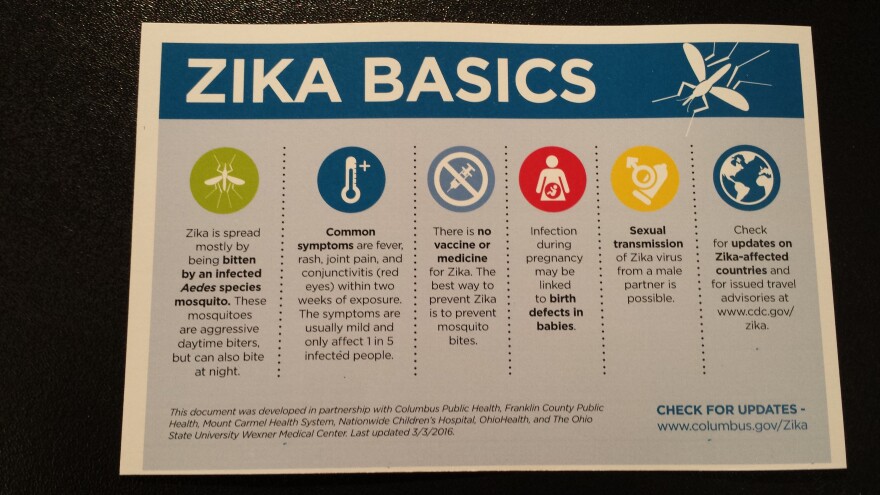
The Centers for Disease Control and the state say Ohio has six confirmed cases of the Zika Virus, all involving people who traveled outside of Ohio. While regional health officials acknowledge the possibility of an outbreak, they want the public to know they're ready to respond and residents can do some simple things to prevent contracting the virus. Mike Foley reports.
Central Ohio’s hospital systems and public health agencies say they’ve been working together to inform the public with a clear message and be transparent should cases evolve. Health officials say there are 28 Zika Virus tests in Columbus and Franklin County as of Wednesday. Six have come back negative, while 22 are still pending. The virus is spread mostly by mosquito bites, but Zika can also be sexually transmitted from a male partner. Fever, rash, joint pain and red eye symptoms are generally mild and affect only 1 in 5 people. But infection during pregnancy has been linked to birth defects. Columbus Public Health Commissioner Dr. Teresa Long.
“Pregnant women should avoid travel to any area where Zika Virus is spreading, where there is local transmission of Zika. If you must travel to one of these areas, talk to your physician and your provider first, and then strictly follow the steps to prevent mosquito bites during the trip. And also to use condoms or to have a partner use condoms every time and correctly with anyone who may have travelled to these Zika-infected areas, or and importantly they may abstain from sex. For men particularly those traveling to areas where Zika is spreading, if they are sexually active with a woman who is or could become pregnant, they should use a condom every time and correctly or abstain from sex.”
Long says the only route to being tested is through each individual’s physician. Test results typically take 2 to 4 weeks. Because there’s no vaccine and no medicine, preventing mosquito bites remains the best protection measure.
“Getting rid of or emptying items that hold water around your yard, neighborhoods and surroundings. Treating rain barrels for mosquitos, checking and repairing those window screens and using the EPA registered insect repellent.”
Charlie Broschart manages the environmental health division at Franklin County Public Health and says the human factor makes this virus so concerning.
“When we’ve looked at other viruses that have come and gone throughout Ohio - West Nile, Eastern Equine, La Crosse - those are all cycled through animals whether it’s birds or mammals. This one, the humans are the carrier so it’s got a little different twist to it. Secondly, we only have one of the mosquitos that is in Ohio, and that’s the Aedes albopictus.“
Broschart says these mosquitos are difficult to trap, but crews will use a variety of methods to manage them including targeted larviciding. He also says residents should report any daytime mosquito bites so crews can treat those areas. But while that specific mosquito in Ohio could potentially transmit the virus, the only mosquito currently known to carry Zika is the Aedes aegypti, and it’s not found in Ohio. That’s why one question posed to the collective gathering of health officials dealt with whether there’s too much concern about the virus in the region. Here’s how OhioHealth chief medical officer Dr. Bruce Vanderhoff responds.
“We’re fortunate to live in a geography where thus far we have not seen mosquito born transmission of this, so this is for us in central Ohio really a question about where we travel, and if we make the decision to travel and then how we conduct ourselves before and after. The other point that should reassure this community is this, this gathering of the health care community to keep an eye on the evolving understanding of this disease, how it’s transmitted and whether or not we need to have additional concerns or cautions in the community.”
Health officials say they’re delivering the message now because spring break looms around the corner for so many in central Ohio. They encourage the public to stay informed online at columbus.gov/zika and through the CDC’s website. They’re also launching an educational campaign at Port Columbus.







